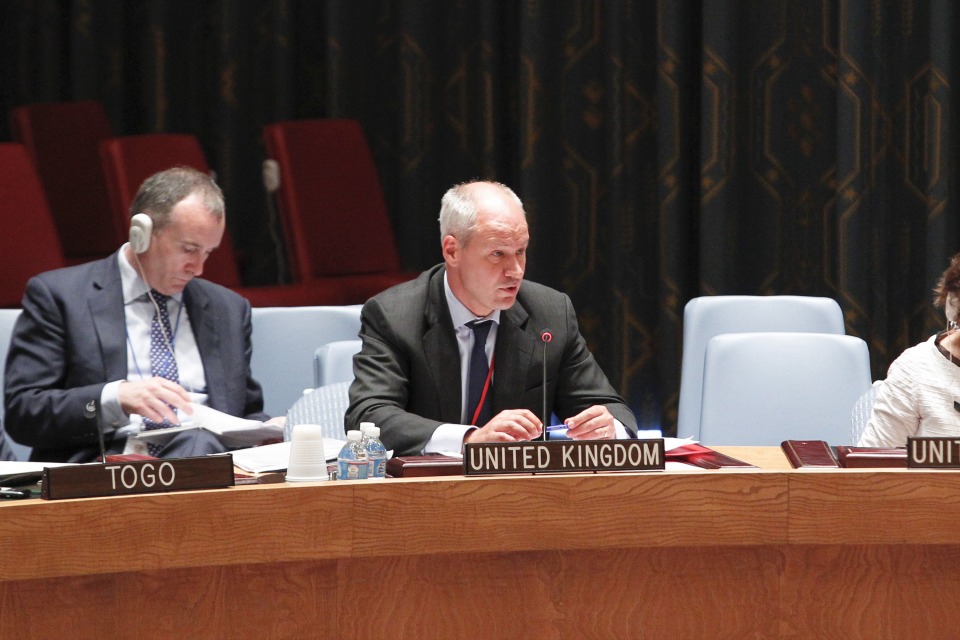The crime of sexual violence is as destructive as any bomb
Statement by Ambassador Peter Wilson, Deputy Permanent Representative of the UK Mission to the UN, to the Security Council Open Debate on Women, Peace and Security

Thank you, Madam President, and thank you for holding this important debate today.
I also thank the Secretary-General for his report, and in particular Special Representative Bangura, her staff, the Team of Experts, and UN Country Teams around the world for their continued efforts to raise awareness and tackle sexual violence in conflict.
I warmly welcome Ms Rhoda Misaka from South Sudan, and the recommendations that you’ve made. I look forward to hearing the statement that the African Union Ambassador will make on behalf of Ms Bineta Diop. Ms Diop’s appointment as Special Envoy on Women and Children in Conflict makes clear the importance the African Union places on the most vulnerable victims of conflict, including on sexual violence.
Madam President,
The Secretary-General’s report is alarming. He is right. This crime is as destructive as any bomb. With data from all over the world, the report demonstrates that sexual violence is prevalent and a matter of profound importance to international peace and security. When unpunished, such crimes sow the seeds for future conflict, perpetuate violence, and undermine the prospects for sustainable development.
If implemented, the report’s recommendations, based on Resolution 2106, will improve support for survivors, reduce the space for impunity, and help prevent future crimes.
Madam President,
Today I want to make three particular points.
First, preventing and redressing sexual violence in conflict is integral to wider work on conflict prevention efforts and a moral duty for governments and citizens of a civilised world. As Special Representative Bangura put it, “It is a great moral duty of our time.”
Many UN agencies, women and civil society organisations, NGOs and human rights defenders work diligently day-by-day to achieve this. But their efforts can only succeed if governments commit their support and work together in a coordinated way to enable robust mechanisms for documenting and investigating acts of sexual violence, greater support to survivors, increased gender based responses in security sector reform, and greater international coordination. If we are serious about eradicating sexual violence in conflict we must resource it. We must also eradicate the root causes of this inhumane crime, including gender inequality, discrimination, and false perceptions of masculinity.
Second, the United Nations leading role in this is absolutely critical. The breadth of United Nations activity is impressive and is also having an impact. The United Kingdom supports all the UN’s work and encourages UN agencies to ‘deliver as one’ in its efforts to support states fulfil their responsibilities. Tackling sexual violence must also be at the heart of strong Protection of Civilians mandates in UN peacekeeping operations, which are primarily delivered through military and police personnel. We welcome the deployment of Women Protection Advisors in MINUSMA and look forward to their deployment in the Central African Republic and other missions.
Third, as noted in the report, my Foreign Secretary and the whole British Government remains committed to this cause.
In just over six week’s time Foreign Secretary William Hague and Angelina Jolie, Special Envoy of the UN High Commissioner for Refugees, will co-chair a Global Summit to End Sexual Violence in Conflict. The goal is to end the culture of impunity for the use of sexual violence both as a tool and a side-effect of war worldwide. In line with the Declaration of Commitment to End Sexual Violence in Conflict, the Summit will identify specific actions by the international community where we believe greater progress is necessary. This will include a number of conflict and post-conflict affected States. We hope will use the opportunity to set out their plans and activity for combating sexual violence.
Collectively we must change the calculus for anyone who thinks that they can use the fog of war as cover to get away with rape and other forms of sexual abuse. We must shift the stigma for such crimes from the victim to the perpetrator. We must ensure there is nowhere to hide for those culpable of grave violations of human rights. We must, as Special Representative said, hold perpetrators accountable. Where violations do occur, we must empower survivors to speak out, safe in the knowledge that they will be supported and protected, and able to access services and legal redress.
Madam President,
I am pleased that since the publication of the Secretary-General’s report on 12 March, Chad, Lesotho, Saint Lucia and Suriname have all endorsed the Declaration of Commitment, taking the number of endorsing countries to 144. This is hugely encouraging. We look forward to welcoming all endorsing countries to the London Summit in June. The United Kingdom strongly encourages countries that have not yet endorsed, particularly those on the Security Council, to do so as soon as possible and to attend the Summit.
Madam President,
Under the Charter, the Security Council has primary responsibility for the maintenance of international peace and security. We know we can improve international peace and security if we eliminate sexual violence in conflict. And we have the opportunity to do so. Through the June Summit, next year’s High Level Review of 1325, and the building of the Sustainable Development Goals, the Security Council and Members States can make progress towards ending this terrible crime. We should all now commit to this goal.
Thank you.